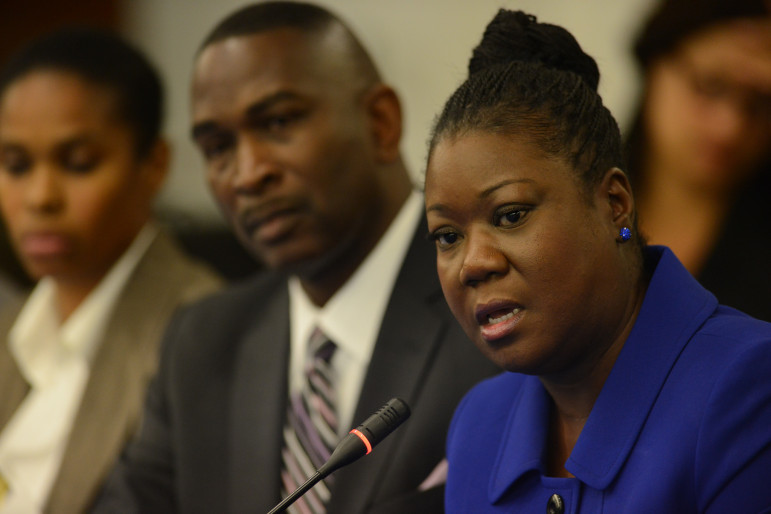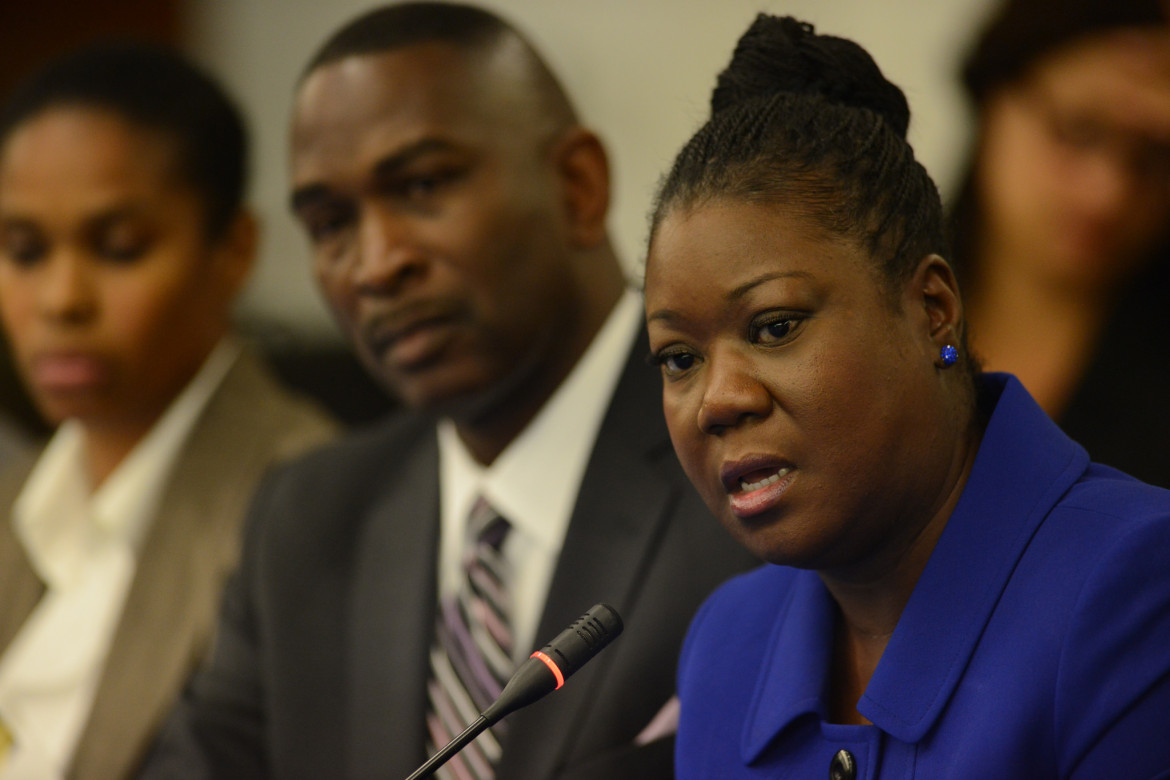
Daniel Cima / CIDH
Sybrina Fulton, mother of Trayvon Martin, with Ronald Davis, father of Jordan Davis.
From The Crime Report:
In May 2014, 50 women who lost children at such disparate crimes scenes as suburban Connecticut’s Sandy Hook Elementary and the streets of South Central Los Angeles gathered in Miami for a “Circle of Mothers,” a project of The Trayvon Martin Foundation.
“A mother who loses a child, in the end, is a mother just trying to heal—no matter where she comes from or what color her skin is,” said Sybrina Fulton, mother of the slain Florida teen for whom the foundation is named.
“That weekend together was amazing for us. I do not remember the last time I laughed that hard or cried as much as I cried.”
Fulton, a former Miami-Dade County Housing Authority program coordinator, traded that post to devote herself full-time to activities of the foundation she co-founded in March 2012 with her ex-husband Tracy Martin. Headquartered at Florida Memorial University, Fulton’s alma mater, its website lists The Children Defense’s Fund, National Urban League and the Rev. Al Sharpton’s National Action Network among its funders.
Her unarmed son had been followed, then killed in February 2012 by George Zimmerman, who argued self-defense under Florida’s controversial “stand your ground” law. A jury decided Zimmerman wasn’t guilty.
Trayvon Martin had been walking back to his father’s house from a Sanford, FL convenience store.
The foundation’s efforts range from providing burial clothes for those killed violently when their families can’t afford them to gathering youth, police officers, legislators, community leaders and others for “Peace Walk and Peace Talk” events across the country.
It also convenes still-grieving moms and dads for Miami weekends of pampering, and of planning how to make their children’s deaths more than subject matter for a fleeting news headline.
In addition to offering outreach services, Fulton has been speaking out on issues of gun violence, and on how race sometimes hinders criminal justice to audiences at home and abroad.
In a recent chat with The Crime Report contributing editor Katti Gray, she discussed the goals of her foundation, the events in Ferguson, MO, and why some Americans refuse to accept the ”ugly” consequences of racial profiling.
The Crime Report: What’s your take on Michael Dunn, who is white, being found guilty this month in the shooting death of black teen Jordan Davis, whom Dunn faulted for being in a car with loud music?
Sybrina Fulton: It doesn’t mean that we are entirely moving in the right direction. But I do believe that some people are looking a little deeper at African-American life and at why we should not find reasons to justify the senseless taking of a black life. Each step like this draws us a little closer to getting some kind of justice.
But even if [Dunn] did 5,000 years in jail that wouldn’t replace Jordan. It doesn’t bring Jordan back. It does send the message that black life matters, and that someone is being held accountable for taking a black life.
TCR: Do you find it significant that, like your own son, Jordan Davis was gunned down in Florida?
Fulton: There’s no difference between Florida and Ferguson, Missouri. In [Sanford,] Florida, a neighborhood watch captain shot the gun. In [Missouri], a police officer did. In Jacksonville, Florida, [Dunn] was a regular citizen. The shooters were white. The common thread is that black kids were the ones who died.
Also, you’re talking—in my family’s case—about a boy who was 17 and [neighborhood watchman George Zimmerman] who was 28. Michael Brown was 18 and the Ferguson policeman is 28. Michael Dunn is [45]. Age—and how we perceive other people—has a lot to do with it.
Some media commentators continue to try and hold innocent teenagers responsible for their own deaths. In all the cases we’ve heard the shooters say they feared for their lives. ‘I thought the kid was a threat, I thought he had a gun’ or something absurd like that. Well, you can’t just think something up and react to the thought. You’ve got to change the thought process.
TCR: Since Zimmerman was found not guilty of murdering your son, you’ve been speaking nationally and internationally, showing up in places like Ferguson and at trials including Michael Dunn’s. What’s your goal?
Fulton: In August, I testified about gun violence and race in Geneva, Switzerland, with someone translating my words at the [85th meeting of the Committee on the Elimination of Racial Discrimination, hosted by the United Nations High Commission on Human Rights.]
In September, I spoke on a panel during the Congressional Black Caucus’ annual conference in Washington D.C.
I share some version of the same message wherever I go. I talk about ‘the ugly truth.’ Many people want to accept the pretty lie before they accept the ugly [facts] about race in America. Those are the kind of people who, when a young woman [in Michigan] who’s been in a car wreck knocks on someone’s door for help, can justify someone blowing the young woman’s face off.
They can justify [New York] police putting a chokehold on a guy selling loose cigarettes and choking him to death. It’s obvious on our own end of things that we have issues with racial profiling.
Others who don’t see the problem often choose not to see it because it’s not happening to them … But the more we talk about the ugly truth, bring it out and shine a light on it, the better position we will be in as a society. These problems won’t entirely go away but they will decrease.
TCR: The U.S. Justice Department is probing whether Zimmerman violated Trayvon Martin’s civil rights and whether to push a civil rights settlement. Your thoughts?
Fulton: It’s hard to speak on this until the Justice Department issues their findings.
I will say the criminal trial ended more than a year ago. All the information from that file should have been transferred to the Justice Department. The trial documents were the first layer of the Justice Department’s investigation.
How much more information do they need before they decide to hold a killer accountable?
Editors Note: After TCR’s conversation with Sybrina Fulton, there were unofficial reports suggesting the Justice Department has decided against launching a civil rights case against Zimmerman. Fulton told us she would prefer not to comment until a decision was announced.
Freelance journalist Katti Gray covers criminal justice, health, higher education and other topics for a range of national and regional magazines, newspapers and online news sites.
The Crime Report (TCR) is the nation’s only comprehensive news service covering the diverse challenges and issues of 21st-century criminal justice in the U.S. and abroad. Staffed by working journalists in New York, Washington and Los Angeles, it is published daily through the year by the Center on Media, Crime and Justice at the John Jay College of Criminal Justice in New York.

Pingback: Guns, Race and Children: Facing Up to the 'Ugly Truth' | Ghost Planet Firearms Academy